Related Research Articles

A chemist is a graduated scientist trained in the study of chemistry, or an officially enrolled student in the relevant field. Chemists study the composition of matter and its properties. Chemists carefully describe the properties they study in terms of quantities, with detail on the level of molecules and their component atoms. Chemists carefully measure substance proportions, chemical reaction rates, and other chemical properties. In Commonwealth English, pharmacists are often called chemists.

Computational chemistry is a branch of chemistry that uses computer simulations to assist in solving chemical problems. It uses methods of theoretical chemistry incorporated into computer programs to calculate the structures and properties of molecules, groups of molecules, and solids. The importance of this subject stems from the fact that, with the exception of some relatively recent findings related to the hydrogen molecular ion, achieving an accurate quantum mechanical depiction of chemical systems analytically, or in a closed form, is not feasible. The complexity inherent in the many-body problem exacerbates the challenge of providing detailed descriptions of quantum mechanical systems. While computational results normally complement information obtained by chemical experiments, it can occasionally predict unobserved chemical phenomena.

Sir John Anthony Pople was a British theoretical chemist who was awarded the Nobel Prize in Chemistry with Walter Kohn in 1998 for his development of computational methods in quantum chemistry.

Physical chemistry is the study of macroscopic and microscopic phenomena in chemical systems in terms of the principles, practices, and concepts of physics such as motion, energy, force, time, thermodynamics, quantum chemistry, statistical mechanics, analytical dynamics and chemical equilibria.
Quantum chemistry, also called molecular quantum mechanics, is a branch of physical chemistry focused on the application of quantum mechanics to chemical systems, particularly towards the quantum-mechanical calculation of electronic contributions to physical and chemical properties of molecules, materials, and solutions at the atomic level. These calculations include systematically applied approximations intended to make calculations computationally feasible while still capturing as much information about important contributions to the computed wave functions as well as to observable properties such as structures, spectra, and thermodynamic properties. Quantum chemistry is also concerned with the computation of quantum effects on molecular dynamics and chemical kinetics.

Jacobus Henricus van 't Hoff Jr. was a Dutch physical chemist. A highly influential theoretical chemist of his time, van 't Hoff was the first winner of the Nobel Prize in Chemistry. His pioneering work helped found the modern theory of chemical affinity, chemical equilibrium, chemical kinetics, and chemical thermodynamics. In his 1874 pamphlet, van 't Hoff formulated the theory of the tetrahedral carbon atom and laid the foundations of stereochemistry. In 1875, he predicted the correct structures of allenes and cumulenes as well as their axial chirality. He is also widely considered one of the founders of physical chemistry as the discipline is known today.
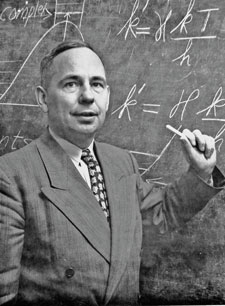
Henry Eyring was a Mexico-born United States theoretical chemist whose primary contribution was in the study of chemical reaction rates and intermediates. Eyring developed the Absolute Rate Theory or Transition state theory of chemical reactions, connecting the fields of chemistry and physics through atomic theory, quantum theory, and statistical mechanics.

Kenneth Sanborn Pitzer was an American physical and theoretical chemist, educator, and university president. He was described as "one of the most influential physical chemists of his era" whose work "spanned almost all of the important fields of physical chemistry: thermodynamics, statistical mechanics, molecular structure, quantum mechanics, spectroscopy, chemical bonding, relativistic chemical effects, properties of concentrated aqueous salt solutions, kinetics, and conformational analysis."
Chemical physics is a branch of physics that studies chemical processes from a physical point of view. It focuses on understanding the physical properties and behavior of chemical systems, using principles from both physics and chemistry. This field investigates physicochemical phenomena using techniques from atomic and molecular physics and condensed matter physics.
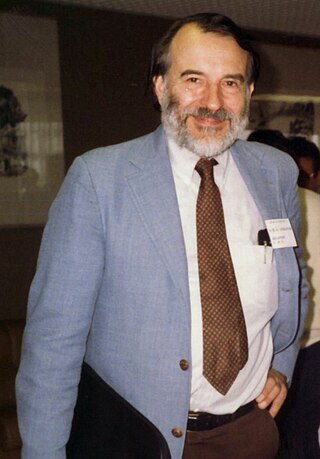
Paul von Ragué Schleyer was an American physical organic chemist whose research is cited with great frequency. A 1997 survey indicated that Dr. Schleyer was, at the time, the world's third most cited chemist, with over 1100 technical papers produced. He was Eugene Higgins Professor of Chemistry at Princeton University, professor and co-director of the Institute for Organic Chemistry at the University of Erlangen–Nuremberg in Germany, and later Graham Perdue Professor of Chemistry at the University of Georgia in Athens, Georgia. He published twelve books in the fields of lithium chemistry, ab initio molecular orbital theory and carbonium ions. He was past president of the World Association of Theoretically Oriented Chemists, a fellow of the International Academy of Quantum Molecular Science and editor-in-chief of the Encyclopedia of Computational Chemistry.

Henry Frederick "Fritz" Schaefer III is a computational and theoretical chemist. He is one of the most highly cited chemists in the world, with a Thomson Reuters H-Index of 121 as of 2020. He is the Graham Perdue Professor of Chemistry and Director of the Center for Computational Chemistry at the University of Georgia. Before becoming professor at Georgia he was professor at University of California, Berkeley and in 2004, he became Professor of Chemistry Emeritus, at UC Berkeley
Ab initio quantum chemistry methods are computational chemistry methods based on quantum chemistry. The term ab initio was first used in quantum chemistry by Robert Parr and coworkers, including David Craig in a semiempirical study on the excited states of benzene. The background is described by Parr. Ab initio means "from first principles" or "from the beginning", implying that the only inputs into an ab initio calculation are physical constants. Ab initio quantum chemistry methods attempt to solve the electronic Schrödinger equation given the positions of the nuclei and the number of electrons in order to yield useful information such as electron densities, energies and other properties of the system. The ability to run these calculations has enabled theoretical chemists to solve a range of problems and their importance is highlighted by the awarding of the Nobel prize to John Pople and Walter Kohn.
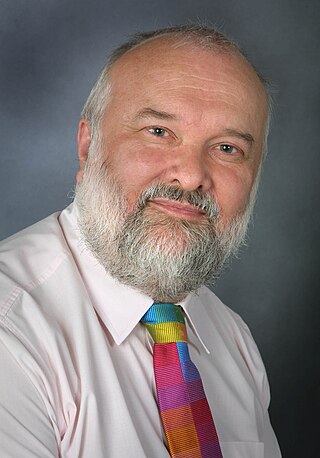
Henry Stephen Rzepa is a chemist and Emeritus Professor of Computational Chemistry at Imperial College London.
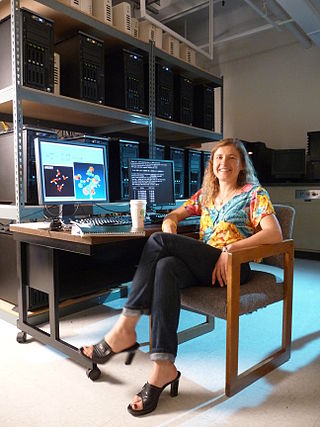
Anna Igorevna Krylov is the USC Associates Chair in Natural Sciences and Professor of Chemistry at the University of Southern California (USC). Working in the field of theoretical and computational quantum chemistry, she is the inventor of the spin-flip method. Krylov is the president of Q-Chem, Inc. and an elected member of the International Academy of Quantum Molecular Science, the Academia Europaea, and the American Academy of Sciences and Letters.
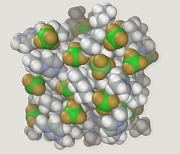
Molecular modeling on GPU is the technique of using a graphics processing unit (GPU) for molecular simulations.
TeraChem is a computational chemistry software program designed for CUDA-enabled Nvidia GPUs. The initial development started at the University of Illinois at Urbana-Champaign and was subsequently commercialized. It is currently distributed by PetaChem, LLC, located in Silicon Valley. As of 2020, the software package is still under active development.
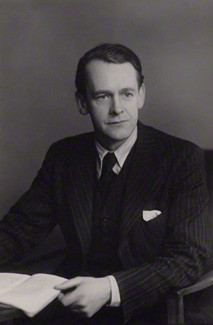
Meredith Gwynne Evans, FRS was a British physical chemist, who made important theoretical contributions in the study of chemical reaction rates and reaction mechanisms. Together with Henry Eyring and Michael Polanyi, Meredith Gwynne Evans is one of the founders of the transition state theory.

Emily A. Carter is the Gerhard R. Andlinger Professor in Energy and the Environment and a professor of Mechanical and Aerospace Engineering (MAE), the Andlinger Center for Energy and the Environment (ACEE), and Applied and Computational Mathematics at Princeton University. She is also a member of the executive management team at the Princeton Plasma Physics Laboratory (PPPL), serving as Senior Strategic Advisor and Associate Laboratory Director for Applied Materials and Sustainability Sciences.
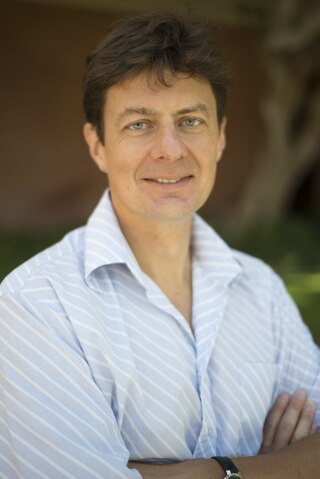
Oleg V. Prezhdo is a Ukrainian–American physical chemist whose research focuses on non-adiabatic molecular dynamics and time-dependent density functional theory (TDDFT). His research interests range from fundamental aspects of semi-classical and quantum-classical physics to excitation dynamics in condensed matter and biological systems. His research group focuses on the development of new theoretical models and computational tools aimed at understanding chemical reactivity and energy transfer at a molecular level in complex condensed phase environment. Since 2014, he is a professor of chemistry and of physics & astronomy at the University of Southern California.
Anastassia N. Alexandrova is an American chemist who is a professor at the University of California, Los Angeles. Her research considers the computational design of functional materials.
References
- ↑ Guarino, Ben; Rosenberg, Eli (30 March 2018). "California ordered to add cancer warning to coffee, but the science doesn't hold up". Washington Post.
- ↑ "1000 Most Cited Chemists 1981-1997". univ-lemans.fr. 14 February 1998. Archived from the original on 14 February 1998.
- ↑ "Archived copy" (PDF). Archived from the original (PDF) on 2011-06-14. Retrieved 2009-07-11.
{{cite web}}: CS1 maint: archived copy as title (link) - ↑ "Bryn Mawr Now: Bryn Mawr Chemistry Podcast Cracks iTunes Top 100". 6 November 2007. Archived from the original on 6 November 2007.
- ↑ Francl, Michelle (1 May 2009). "Table manners". Nature Chemistry. 1 (2): 97–98. Bibcode:2009NatCh...1...97F. doi:10.1038/NCHEM.183. PMID 21378810.
- ↑ Francl, Michelle (22 March 2018). "Atomic women". Nature Chemistry. 10 (4): 373–375. Bibcode:2018NatCh..10..373F. doi:10.1038/S41557-018-0038-3. PMID 29568054. S2CID 7907995.
- ↑ "Philadelphia Section Award". American Chemical Society. Retrieved 2019-07-11.
- ↑ Mather, Victor (January 24, 2024). "The Biggest British-American Tea Kerfuffle Since ... Well, You Know". The New York Times .
- ↑ Frayer, Lauren (January 25, 2024). "A U.S. scientist's tea recipe has Brits aghast. Salt? Warm milk? The horror!". NPR .
- ↑ "US scientist recommends adding salt to make perfect cup of tea". 2024-01-24. Retrieved 2024-02-17.
- ↑ Davis, Nicola; correspondent, Nicola Davis Science (2024-02-16). "Deja brew: chemistry professor's latest advice on tea drinking – try grapefruit". The Guardian. ISSN 0261-3077 . Retrieved 2024-02-17.